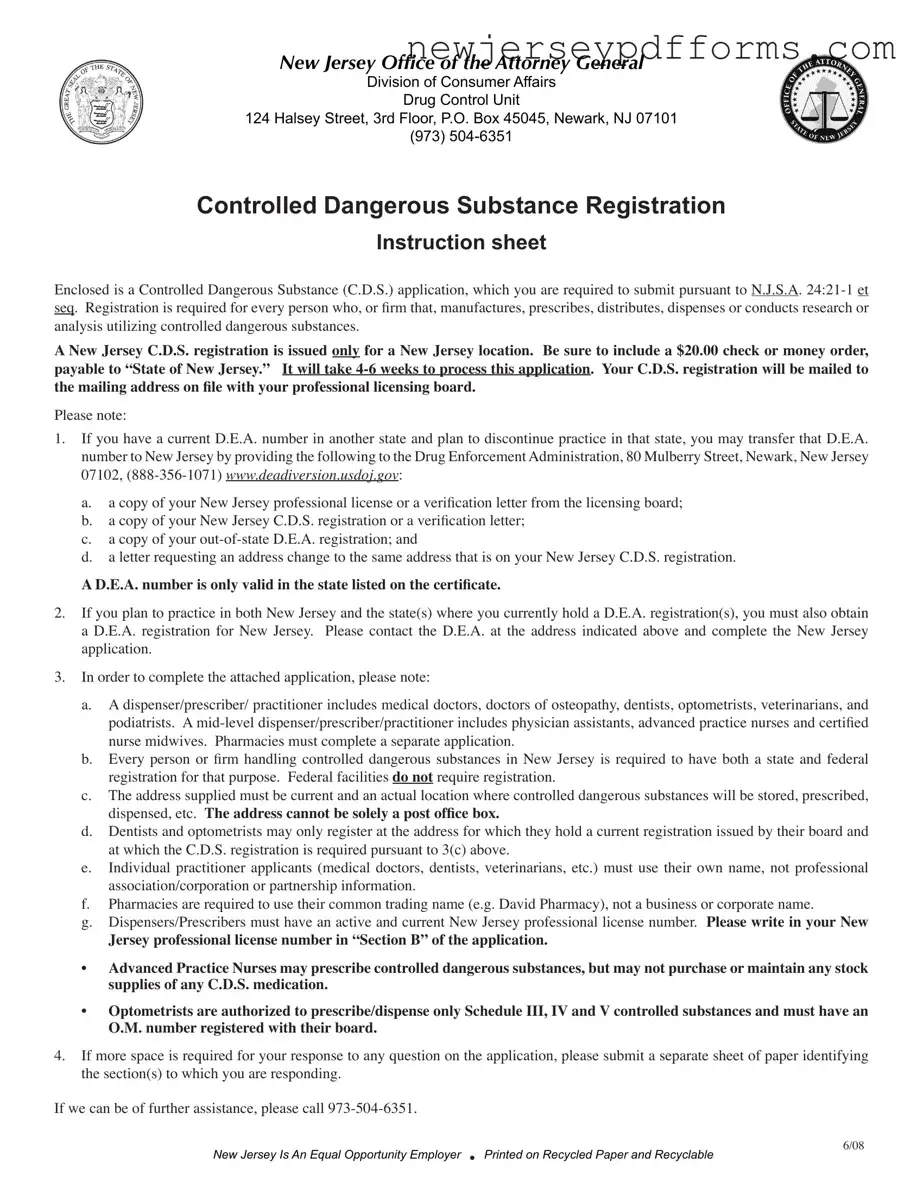The New Jersey Controlled Dangerous Substance Registration form is similar to the Drug Enforcement Administration (DEA) registration application. Both documents are essential for individuals or organizations that handle controlled substances. The DEA registration is required at the federal level, while the New Jersey registration is specific to state regulations. Each application process requires detailed information about the applicant, including their professional license and the location where controlled substances will be used. Both forms also necessitate a fee and can take several weeks to process, emphasizing the importance of compliance with both state and federal laws regarding controlled substances.
Another document that resembles the New Jersey Dangerous Substance Registration form is the state pharmacy license application. This application is crucial for pharmacies that wish to operate legally within New Jersey. Like the C.D.S. registration, the pharmacy license application demands specific details about the business, including the physical location and the responsible individual. Both documents require an application fee and are subject to state inspections. The pharmacy license ensures that the establishment adheres to regulations governing the dispensing of medications, including controlled substances.
The medical board application for healthcare providers also shares similarities with the New Jersey C.D.S. registration form. Healthcare providers, such as physicians and dentists, must obtain a medical license to practice legally. The application process involves providing personal information, proof of education, and any disciplinary history. Both applications require a thorough vetting process to ensure that practitioners meet the necessary qualifications to handle controlled substances safely and ethically.
The state business registration application is another document akin to the C.D.S. registration form. This application is necessary for any business operating in New Jersey, including those involved in the healthcare sector. Both forms require detailed information about the business structure, ownership, and location. Additionally, both applications are designed to ensure that businesses comply with state regulations and are subject to inspections to maintain operational standards.
The controlled substance inventory form is also similar to the New Jersey Dangerous Substance Registration form. This document is used by businesses that handle controlled substances to maintain accurate records of their inventory. Like the registration form, it requires detailed information about the substances in possession, including quantities and storage locations. Both forms are critical for compliance with state and federal regulations, ensuring that controlled substances are tracked and managed appropriately.
The state health department's permit application for laboratories mirrors the C.D.S. registration form in its purpose and requirements. Laboratories conducting tests involving controlled substances must obtain a permit from the state health department. Both applications require information about the facility, personnel, and the substances being handled. They also emphasize the importance of adhering to safety and regulatory standards to protect public health.
The application for a controlled substance research permit is another document that shares characteristics with the New Jersey C.D.S. registration form. Researchers intending to study controlled substances must apply for this permit, detailing their research objectives and the substances involved. Both applications require a comprehensive review process to ensure that the research complies with ethical standards and state regulations regarding controlled substances.
For individuals looking to secure their wishes after passing, the form titled "vital California Last Will and Testament documentation" provides a structured way to communicate asset distribution intentions. This document not only ensures your desires are honored, but also aims to minimize potential conflicts among heirs. Explore the necessary details by visiting the form link below: essential California Last Will and Testament form.
The application for a veterinary license is similar to the New Jersey C.D.S. registration form as well. Veterinarians must be licensed to practice and prescribe medications, including controlled substances for animals. Both applications require proof of education, professional qualifications, and adherence to state regulations. This ensures that veterinarians are equipped to handle controlled substances responsibly and in the best interest of animal health.
The application for a mid-level practitioner license, such as for nurse practitioners or physician assistants, resembles the C.D.S. registration form. Mid-level practitioners are authorized to prescribe controlled substances under specific conditions. Both applications require detailed information about the applicant's qualifications and the scope of their practice. This ensures that mid-level practitioners can safely prescribe medications while complying with state laws regarding controlled substances.
Lastly, the application for a medical facility license, such as for hospitals or clinics, is similar to the New Jersey Dangerous Substance Registration form. Medical facilities must obtain a license to operate legally and handle controlled substances. Both applications require comprehensive information about the facility, including its location and the personnel involved. This process helps ensure that medical facilities adhere to state regulations and maintain high standards of care when dealing with controlled substances.

